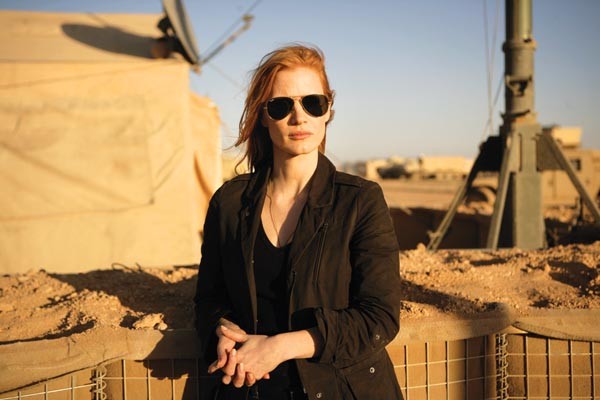When director Kathryn Bigelow and her screenwriting partner Mark Boal set out to make the film once known as "The Untitled Osama Bin Laden Project," the mastermind of the Sept. 11 attacks was still at large. The story was about the years-long pursuit, much of which occurred behind various CIA and black-ops curtains. Then, Bin Laden was located and killed, and the film got a new title, Zero Dark Thirty, and a classic ending.
Except this film isn't really a rah-rah story of action dudes pursuing and killing the bad guy, re-establishing American justice and providing a vicarious exorcism of evil. For starters, the protagonist is a woman, a CIA analyst named Maya, who is more of a desk jockey than an armed warrior. And the "victory," won with a decade's worth of blood and treasure, is open to debate.
Maya is based mostly in Pakistan, and spends the better part of a decade obsessively searching for Bin Laden, even as the agency's, and the world's, focus shifts away. (Maya is reputedly based on an actual woman, who may also be the basis for the similarly obsessed CIA analyst depicted on Homeland. As always, with matters Hollywood and CIA, one should never assume total veracity in what is depicted on screen.)
As the driven Maya, an excellent Jessica Chastain heads an ensemble cast that includes Jessica Ehle, Jason Clarke, Kyle Chandler, Chris Pratt and James Gandolfini. Maya is a non-showy, methodical role that Chastain gradually convinces us of, much as her character doggedly establishes her bona fides in the not-always-compatible men-and-military world she inhabits.
Bigelow opts for a straightforward linear narrative, beginning with Sept. 11, 2001, and ending just after the raid on Bin Laden's home. (As a historical framework, Bigelow includes news footage from real-life moments of terror, such as the bombings on London transit and at the Marriott, in Islamabad.) The film is divided into titled chapters, but is composed of three main parts: the "dark side" years immediately following 9/11, a "tradecraft" procedural and the final mission.
In the first third, the story segments feel disjointed and somewhat confusing, intended to mirror history when the pursuit of Bin Laden was both urgent and scattershot. This is also the era of black sites and "enhanced interrogation," both of which the film depicts. (ZDT has spurred a lot of gum-flapping about what, if any, function torture played in the "war on terror," and whether the film suggests torture is effective. I say it doesn't, but folks may see what they want to see here.)
For me, the middle of the film was the most interesting, depicting the lesser-known story of how Bin Laden was located. This portion, the lengthiest, is essentially a procedural, in which Maya marshals resources to identify and pursue a man she believes is Bin Laden's courier, hoping he will lead them to the target. All the low-glam slog of detective work — plowing through data, monitoring, surveillance — not only reinvigorates the focus, but also establishes an actionable case. (Noted in the halls of the Obama White House, when the mission is debated: "The president is a thoughtful and analytical guy — he needs proof.")
The last third is the mission itself, which despite its known outcome, is still relatively fraught, even as it appears to play out in real time and without the whiz-bang one expects from the action-movie version. It's tense, but also dark, murky and more disturbing than fist-pumping. (The soundtrack is whispered military commands, gunshots, and women and children crying.)
Ultimately, Bigelow has made a notable film, one that condenses a lot of history into a manageable, even entertaining package, while eschewing jingoism. This documentary-like approach, without the usual emotional flourishes, may be why different viewers see different films: There's a lot of empty space for filmgoers to fill in their own reactions to this post-9/11 decade, which we've all processed differently.
Zero Dark Thirty is fairly sober right through, and anyone looking for an exhilarating conclusion will be disappointed. The story's final question is left for viewers to ask and answer: It's been nearly two years since Bin Laden was killed, and what exactly have we won and lost in this ever-morphing, ongoing war on terror? Even Hollywood can't put a Hollywood ending on it.















